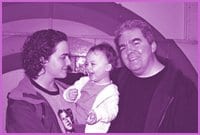Steve Houston’s union activism exploded in high school when the then-16-year-old, class president inspired a wildcat strike and shut the place down for the right to wear blue jeans.
Houston chuckles about the incident. “It was just spontaneous combustion. We all walked out. It was the ’60s. We wanted to get rid of school uniforms, wanted to have our own individuality.”
Today, he says, “there’s a rightwing mentality that wants to take us back to the uniforms because if everybody’s uniform, and nobody steps outside the box, then we’ll go back to the good old days.”
He shakes his head. “But they were never good old days.”
The 50-year-old is one of the local labour movement’s hardcore activists. It’s not about getting raises, for him; it’s about inclusiveness and the social justice movement. “It’s a vehicle to express what my ideology is and what my philosophy is. To me it’s all about equality,” Houston says. “In the BC region, I’m the head fag for the Public Service Alliance of Canada (PSAC) but within that, in the subdivision within my union, I’m on the national human rights committee as well.”
He further advances his human rights agenda as an active member of Egale. “I think there’s a historical connection between Egale and the union movement. A lot of people who came before me in the union movement were very active in establishing Egale and doing a lot of the work that Egale is so well known for now.
“I like that connection between the union and community.”
His union activity stopped while his son, Aaron, grew up. “When I leave this planet I want my granddaughter and my family to be able to say: ‘Well, he did something worthwhile,'” he muses. “I’ve been very open with him, and out since the start. He spent a lot of his weekends with me, knew all my friends, and was part of the community-like a little mascot. He’s been very supportive.
“He’s 25 now and he’s married and I have a granddaughter, Zoe. She’ll be two in July, and she comes to the Pride Parade,” he gushes. “I’m a good grandfather. I baby-sit her a lot.” Zoe takes him by the hand to sit on the floor with her. “She talks, but not English yet. A lot of times we lay on the floor and just look at each other. We meet eye to eye.” Houston grins.
He thought coming out would destroy his relationship with his mother, now 72, “but it’s actually made us a lot closer. When I came out it was cathartic for her, too, because we strongly suspected my father was gay, so it opened up a lot of doors for her as well. We had a very tumultuous family life and I think that was why; my father lived this repressed hetero life.” He died when Houston was 16.
As an adolescent, his connection with his grandmother was out of a movie. “Have you ever seen La Vie en Rose?” he snickers. “The relationship I had with my grandmother was very much like that. I used to do her hair, you know, and we would have tea parties,” he recalls, “but I was her favourite grandson so she encouraged whatever I wanted to do, like smoking Cameo cigarettes. She taught me how to sew, let me play with her makeup.”
As a member of the gay labour unionists group Multi-Union Pride, Houston was instrumental in bringing Jim Sinclair, president of the BC Federation of Labour, to march in the Pride Parade. Sinclair has carried the federation banner for three years running. “I think back to the ’70s when the unions first started talking about negotiating same-sex benefits. There were catcalls and jeers and it was not a popular topic, but the movement has evolved and is much more inclusive now. The old guard of the union movement still harbours homophobia.” He smiles. “It was really important for us to see our leadership come march with us.”
Houston is excited by the union movement’s progress toward international solidarity. His union is now negotiating with the employer for one cent per hour per member to go into a social justice fund.
“We’re negotiating not only for our benefit, but also for the benefit of brothers and sisters around the world. So I think queers in a so-called free, democratic world like Canada, where the biggest issue seems to be equal marriage, have a responsibility and a duty to help struggles in other parts of the world, where to be queer is to be killed or tortured. I’m really proud that the union movement is getting more involved.”

 Why you can trust Xtra
Why you can trust Xtra


